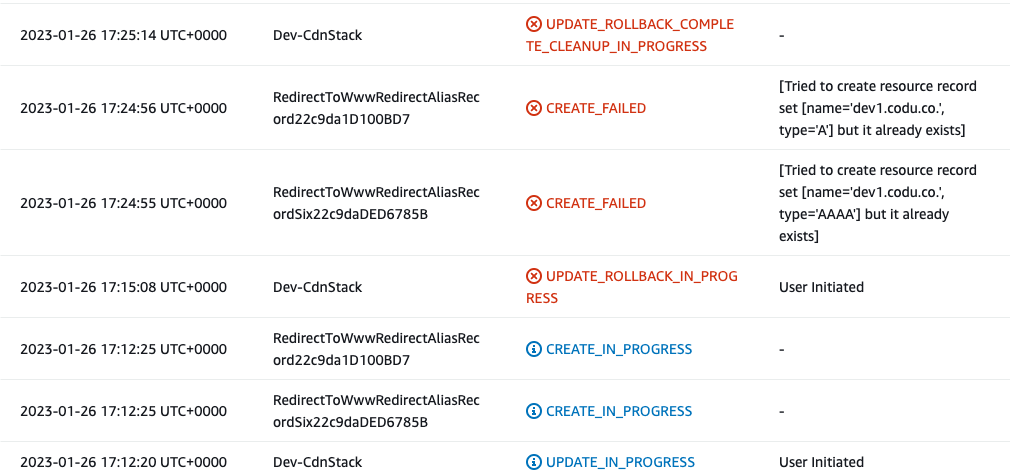Logical ID keeps changing for HttpsRedirect (aws-route53-patterns) #23869
-
|
I'm running into an issue where I have a stack that uses I'm new to CDK, so I could be missing something simple. It's part of my Codepipeline and every time I release a change (even without changing any code) the logical ID is recreated and different (which I didn't think was supposed to happen). All my other stacks behave normally, but it seems that the Here's the code in case it helps: https://github.com/codu-code/codu/blob/develop/cdk/lib/cdn-stack.ts Any help is appreciated! ❤️ |
Beta Was this translation helpful? Give feedback.
Replies: 2 comments
-
|
Looks like it's creating a hash for each domain and because I use tokens, it's changing every update/deploy. Since I use the Here's the source code from the package that was causing the issue: domainNames.forEach((domainName) => {
const hash = md5hash(domainName).slice(0, 6);
const aliasProps = {
recordName: domainName,
zone: props.zone,
target: RecordTarget.fromAlias(new CloudFrontTarget(redirectDist)),
};
new ARecord(this, `RedirectAliasRecord${hash}`, aliasProps);
new AaaaRecord(this, `RedirectAliasRecordSix${hash}`, aliasProps);
});And here is a link to the package in cdk in case it changes. So my fix was to manually create the pattern locally, which looks like this in case anyone needs it: export class CdnStack extends cdk.Stack {
constructor(scope: Construct, id: string, props?: cdk.StackProps) {
super(scope, id, props);
const domainName = ssm.StringParameter.valueForStringParameter(
this,
`/env/domainName`,
1
);
const hostedZoneId = ssm.StringParameter.valueForStringParameter(
this,
`/env/hostedZoneId`,
1
);
const wwwDomainName = `www.${domainName}`;
const zone = route53.HostedZone.fromHostedZoneAttributes(this, "MyZone", {
hostedZoneId,
zoneName: domainName,
});
const certificate = new acm.DnsValidatedCertificate(this, "Certificate", {
domainName,
subjectAlternativeNames: [`*.${domainName}`],
hostedZone: zone,
region: "us-east-1",
});
const redirectBucket = new s3.Bucket(this, "RedirectBucket", {
websiteRedirect: {
hostName: wwwDomainName,
protocol: s3.RedirectProtocol.HTTPS,
},
removalPolicy: cdk.RemovalPolicy.DESTROY,
blockPublicAccess: s3.BlockPublicAccess.BLOCK_ALL,
});
const redirectDist = new cloudfront.CloudFrontWebDistribution(
this,
"RedirectDistribution",
{
defaultRootObject: "",
originConfigs: [
{
behaviors: [{ isDefaultBehavior: true }],
customOriginSource: {
domainName: redirectBucket.bucketWebsiteDomainName,
originProtocolPolicy: cloudfront.OriginProtocolPolicy.HTTP_ONLY,
},
},
],
viewerCertificate: cloudfront.ViewerCertificate.fromAcmCertificate(
certificate,
{
aliases: [domainName],
}
),
comment: `Redirect to ${wwwDomainName} from ${domainName}`,
priceClass: cloudfront.PriceClass.PRICE_CLASS_ALL,
viewerProtocolPolicy: cloudfront.ViewerProtocolPolicy.REDIRECT_TO_HTTPS,
}
);
const redirectRecordProps = {
zone,
recordName: domainName,
target: route53.RecordTarget.fromAlias(
new targets.CloudFrontTarget(redirectDist)
),
};
new route53.ARecord(this, "ARedirectAliasRecord", redirectRecordProps);
new route53.AaaaRecord(
this,
"AaaaRedirectAliasRecord",
redirectRecordProps
);
}Hopefully it helps someone else that gets stuck following a similar pattern. |
Beta Was this translation helpful? Give feedback.
-
|
Hello! Reopening this discussion to make it searchable. |
Beta Was this translation helpful? Give feedback.

Looks like it's creating a hash for each domain and because I use tokens, it's changing every update/deploy. Since I use the
valueForStringParameter, it has a different token each time, which is hashed into a new value too.Here's the source code from the package that was causing the issue: